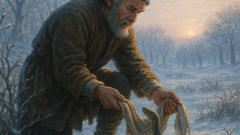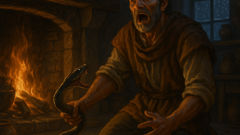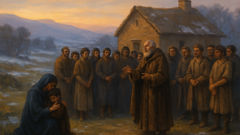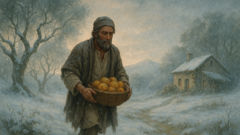Introduction
In the soft, mist-laced dawns of Arcadia, where wild thyme and violets grew in untamed meadows and olive trees twisted with centuries of memory, there once lived a farmer whose heart beat in rhythm with the land. His small cottage, roofed in warm terracotta and draped in grapevines, lay on the edge of a sleepy village that overlooked green valleys and distant, blue-grey mountains. Every morning, the farmer would rise before the sun, his hands already calloused with the honest labor of sowing seeds, tending sheep, and coaxing life from the stony earth. His name was Philon—a man known not for wealth or cleverness, but for a kindness as steady as the river that wound its way through the valley. Neighbors greeted him with smiles and baskets of figs, for he always lent a hand when storms flattened fields or when illness swept through the village. His gentle wisdom was trusted as much as his strength. Yet, as winter’s breath settled over the land and the world grew brittle and white, even Philon’s warmth was tested. The snow that year was heavier than any could remember, blanketing the fields, muffling the calls of distant shepherds, and sending wild creatures scurrying for shelter. It was in this season of hunger and cold, with the earth silent and shivering beneath its white cloak, that fate placed a test upon Philon’s path—a test that would echo through generations as a lesson, carried on the lips of grandmothers beside their hearths and scribes beneath flickering lamps. For one morning, as Philon trudged through the snow to check his frozen vines, he would find a viper curled upon the path, as lifeless as the frost itself. And in that moment of compassion, the boundary between mercy and wisdom would blur, forever changing the farmer, and those who would remember his story.
The Kindness of Philon
Philon was not a man to seek out adventure or drama. His days unfolded with a gentle regularity—mending fences, feeding animals, tending to his orchard and vines with patient care. The people of his village, Agnathos, counted themselves fortunate to know him; they brought him their worries, their harvests, their injured animals, and he would listen, advise, or heal as best he could. In an age when stories were woven with the golden threads of gods and heroes, Philon’s heroism was quieter—a life lived in harmony with the rhythms of the earth and the needs of his neighbors.

That winter, the air was sharp and the earth seemed to exhale frost with every breath. The rivers shrank beneath ice, the sheep huddled together in their stone pen, and even the birds fell silent in the trees. Philon felt the cold press into his bones as he rose each day, but he refused to let hardship harden his heart. When he found a stray lamb on the edge of the forest, he wrapped it in his own cloak. When an elderly widow shivered in her hut, he chopped extra firewood and left it at her door without a word. His kindness was unassuming—never demanding thanks, never weighing what he gave.
One morning, as the sun struggled to rise behind clouds heavy with snow, Philon made his rounds through the orchard. His breath hung in the air, white and slow. As he passed a tangle of bramble near the path, something caught his eye—a strange, dark shape lying almost hidden beneath the snow. Kneeling, he brushed aside the cold powder and found a viper, coiled tight and unmoving, its scales dull and lifeless. The serpent’s body was rigid, and for a moment Philon thought it dead. But as he looked closer, he saw a faint tremor in its side—a shallow, desperate breath.
Philon’s first instinct was caution. He knew vipers well; their bite was swift and deadly, and villagers whispered stories of children and shepherds felled by venom. Yet, looking upon the suffering creature, Philon felt only pity. The viper, he reasoned, was as much a child of the earth as any lamb or sparrow. Perhaps, in the grip of winter, all creatures deserved mercy. So, gently, he slipped off his woolen scarf and wrapped the viper within it, careful to keep its mouth away from his hands. He tucked the bundle close to his chest, feeling the chill through his tunic, and carried it back to his cottage. Inside, the fire still glowed low on the hearth. Philon placed the viper near the warmth, setting it beside a clay jug filled with water. He spoke soft words—not spells, but the sort of encouragement he offered to frightened lambs and wild birds. For hours, he watched over the serpent as its color returned and its body softened in the heat. Outside, snow drifted against the windows, but inside, compassion filled the air.
The Awakening and Betrayal
As midday neared, the viper began to stir. Its tongue flicked from its mouth, testing the air. Its eyes, once glazed with cold, shone with a new sharpness. Philon watched, fascinated by the transformation. He had seen many animals revived from the brink of death, but none so striking as this serpent—its return to life seemed almost miraculous.

Yet, as the viper grew stronger, a subtle change crept into the room. The air, once warm with gratitude and hope, now carried a trace of unease. The viper coiled tighter, its head lifting with wary alertness. Philon saw it, but refused to let fear guide him. He offered a bowl of fresh milk, a gesture he had used to comfort other injured animals, though he knew little of a viper’s true needs. The serpent ignored the gift, focusing instead on the heat and the man who had saved it.
As the sun slipped behind clouds, casting pale light through the cottage’s small window, Philon prepared to return the viper to the wild. He gathered his courage and reached for his scarf. In that instant—faster than thought—the viper struck. Its fangs found the skin of his forearm, piercing deep. Philon gasped, feeling the burn of venom rush beneath his skin. The viper uncoiled, dropping to the floor, and with a flicker of movement, vanished beneath the bench. Pain blossomed in Philon’s arm, spreading swiftly. He staggered to the door and called for help, but his cottage stood alone at the edge of the village; only the distant caw of crows answered. He sank to his knees by the fire, clutching his wounded arm. His thoughts raced—bewilderment, regret, a flicker of anger. Why had the viper bitten him, after he’d given it warmth and life?
As the venom worked its cruel way, Philon’s breath slowed. He realized, with growing clarity, that kindness alone could not change what lay at the heart of another. The viper had acted not from malice, but from its nature—a truth as old as the stones in the riverbed. In his final moments, Philon wished only that his story might serve as a warning to those who came after: compassion is noble, but wisdom must guide it. Outside, the snow continued to fall, covering his footprints and the serpent’s trail alike.
The Lesson Echoes Through Arcadia
Philon’s passing did not go unnoticed. When villagers found him beside the hearth, the scarf still draped across his lap and the mark of the viper clear upon his arm, sorrow swept through Agnathos like a cold wind. Neighbors gathered to mourn, their voices low with grief and disbelief. How could such misfortune fall upon the kindest among them? The tale of the farmer and the viper spread quickly—first among the villagers who had known Philon’s gentle ways, then to neighboring towns and shepherds on distant hills. Each retelling brought new questions and reflections. Some wept for the loss, others grew angry at the unfairness of fate, while a few wondered whether Philon’s mercy had blinded him to danger.

In time, elders gathered children by the fire and spoke of Philon’s fate, shaping his story into a lesson. They warned that while compassion was a virtue, it must be tempered with discernment. Not all creatures—nor all people—could be changed by kindness alone. Some, like the viper, carried their nature deep within them, untouched by warmth or goodwill. To ignore this truth was to invite suffering. Yet, the tale was not told to inspire fear or suspicion. Instead, it encouraged wisdom: to help those who were worthy of trust, but to remain cautious with those whose hearts could not be known. The fields of Arcadia grew green again as spring returned, and wildflowers covered the earth where snow had lain. The village remembered Philon not just for his tragic end, but for his unwavering kindness and the lesson he left behind. His life became a symbol—etched in the stories whispered through generations, a warning painted onto the walls of time itself.
Conclusion
The story of the farmer and the viper endures because it speaks to something unchanging within the human heart—a yearning to believe that goodness can transform even the darkest spirit. Philon’s kindness was genuine, his intentions pure, yet nature itself drew a line that compassion could not cross. In a world where mercy and trust are precious but fragile, his fate reminds us that wisdom must stand beside generosity. We must look closely at those we choose to help and recognize that not every soul can—or wishes to—be changed. The snow will always fall in Arcadia, covering both the good and the wicked in a silent shroud, but Philon’s story lives on in every act of kindness tempered by understanding. So, as tales are told by firelight and seasons turn again, let us remember: it is noble to offer warmth, but wiser still to know whom to invite into our hearts.













